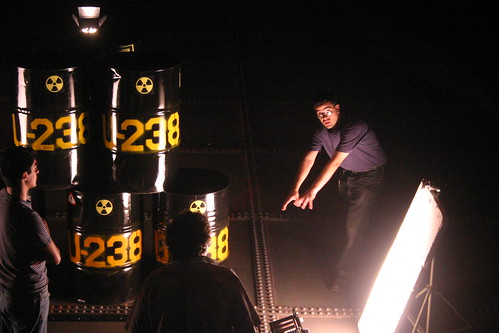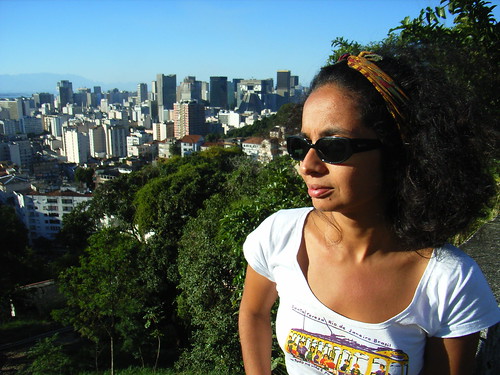From: Documentary Field Notes and Flashpoints <misac@socialdoc.net>
Date: 2 June 2011 05:05
Subject: Documentary Field Notes and Flashpoints
To: mediamentor@gmail.com
Documentary Field Notes and Flashpoints |
| Uranium film festival of Brazil Posted: 01 Jun 2011 10:15 PM PDT  "Uranium 238: La bomba sucia del Pentágono"selected as one of the eight best films of the Uranium Film Festival of Rio de Janeiro 2011. One of my films, Uranium (NFB 1990) was selected to participate in the first international Uranium Film Festival in Brazil, which just ended. As Brazil is not known for its uranium or nuclear industry, I found this intriguing. I put some questions to Marcia Gomez de Oliveira, the Director of the Festival, and the director of programming Norbert G. Suchanek. 1. Why a festival of films on uranium? Marcia Gomes de Oliveira: Because nuclear power plants cannot exist without uranium mining. And that factor is still not known to the general population or society. Also totally unknown to the public here in Brazil and in Latin America are the environmental and social consequences and the negative health effects of uranium mining and other installations of the complex nuclear energy industry. Our film festival wants to change that, wants to "popularize" this important information. Most of the documentaries and movies about uranium, mining, nuclear energy or the Chernobyl disaster have never been shown in Brazil and were never translated into our language, Portuguese. There is a huge language barrier between the English and Portuguese-speaking world. Our festival is the first step in breaking down that wall. In addition, of course we want to stimulate filmmakers, especially filmmakers from Latin America and from Portuguese-speaking African countries, to produce documentaries and movies on nuclear and radioactive subjects. And why in Brazil? Marcia: Because we have nuclear power plants and uranium mines. And, starting with ex-president Lula da Silva, the Brazilian government wants not only to triple the production of Yellow Cake but also in the near future export enriched uranium. That is not all. The government is now constructing a third nuclear power plant, Angra 3, and wants to build up to 40 or 50 new nuclear power plants all over Brazil. Our government wants to transform our country into a globally important nuclear power. The Brazilian people until today have not been aware of this huge nuclear program. And we have to discus it, before it becomes reality, before it is too late. Why on uranium and not for example hydroelectric dams? The nuclear or uranium question is as important as the question of hydroelectric dams. The difference is that in Brazil, since the 1980s people already know about the negative effects of the big dams and hydroelectric power plants like Itaipu, Tucurui or Balbina. They are visible. However, the effects of radioactivity, the effects of uranium mining are not yet visible in our society. For that, we are working to spread independent information in form of documentaries about the whole nuclear energy complex and the radioactive risks. 2. For Norbert: You have seen pretty much everything that's been done on uranium mining and its consequences over the last 30 years (40, right ?) Norbert: As journalist and activist born in formerly West Germany, I followed the nuclear question for more than 30 years now. In Europe, "uranium mining" was always a forgotten subject because most of the uranium mining happens in other continents. The huge uranium mine of East Germany was also "forgotten" because it was simply a secret behind the Iron Curtain. The huge problems in the uranium mines of Portugal were not questioned outside of Portugal because of the language barrier and because that small country in the edge of Europe was not part of the early European Community. Therefore, for decades uranium mining was not visible to the European public and to most of the people worldwide. Looking at all of them, what role has documentary played with respect to this issue? Documentaries have been one of the most important vehicles to bring the uranium case into the public. Like I said, mining was not visible for the people, because it happened in secrecy or in other countries. Until today, the question of Nuclear Energy has been mainly fixed on the question of "Nuclear Waste" from nuclear power plants and nuclear accidents. Starting with documentaries about uranium mining in Australia, documentaries about the fight of indigenous peoples against mines, people in the industrialized nations are becoming slowly aware that the fuel of Nuclear Power plants do not come from heaven. But will require many more documentaries to inform all of our societies, so that the people and their politicians can make correct and wise decisions in future. Can you mention a couple of films which stand out ? First of all your documentary Uranium and this is not because I want to be polite. Your documentary is simply a good piece of work with impressive images and one of the first that explores the consequences of uranium mining in Canada in a profound way. From the other films that we selected for our festival, I personally like very much the documentary Fight for Country (the story of the Jabiluka Blockade) from Pip Starr, a film director who sadly died far too young. In the year 1998, Pip Starr spent over a year working with the aboriginal Mirrar people opposing a second uranium mine on their land. Finally, thousands of people from all over Australia traveled to the Kakadu National Park to join the Mirrar in their struggle. Produced in 2001, Fight for Country shows that people who stand up against uranium mining are not alone! The third documentary I want to mention is a new production by film director Klara Sager from Sweden. The location of "Under the surface – Om bergen faller sönder" produced in 2010/11 is the Hotagen, a mountain area in the North of Sweden. Young, well-educated geo-engineers and technicians are hiking through a beautiful landscape in search for uranium, without any feeling, about what will happen to that amazing place of earth if one day uranium mining starts. On the other side, you have normal local people, elderly, who do not want uranium mining nor uranium prospecting happen in their land. It is interesting to see, that Swedish people who are against uranium mining are not young students or "hippy"-type activists, but normal, elderly people. Under the surface also brings to light another kind of modern generation conflict – technicians and engineers fresh from the university working for international mining companies against elderly local people, grocery shopkeepers, housewives and the indigenous Sami, reindeer herders, with a totally different concept of nature and living. Thanks to Tobi Elliott for her help with the blog. |
| You are subscribed to email updates from Documentary Field Notes and Flashpoints To stop receiving these emails, you may unsubscribe now. | Email delivery powered by Google |
| Google Inc., 20 West Kinzie, Chicago IL USA 60610 | |


